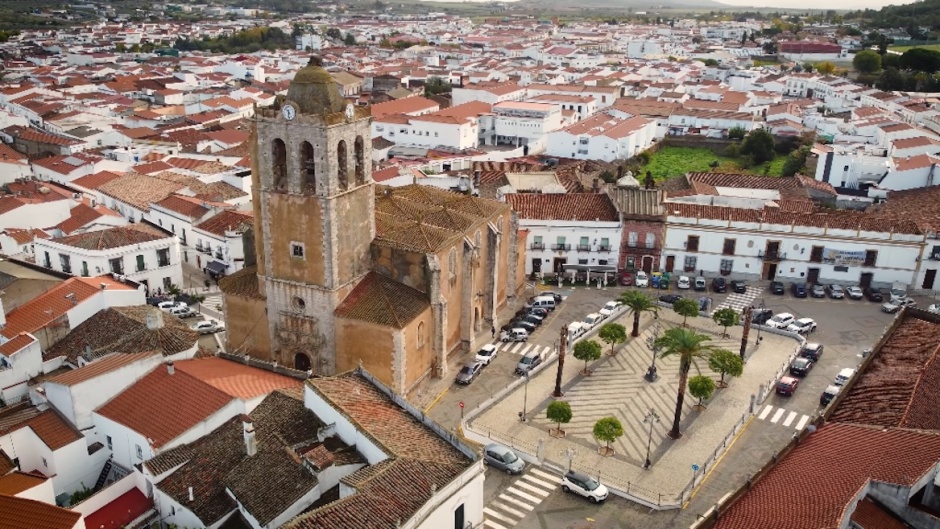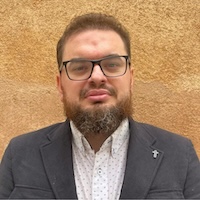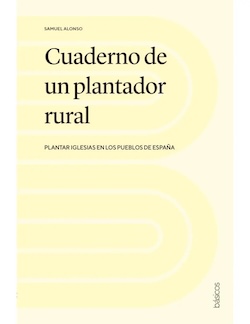Samuel Alonso, a pastor in a small town in Extremadura (western Spain), publishes Notebook of a Rural Planter, a book in which he addresses the challenges of missionary work in rural contexts.
 An aerial view of Los Santos de Maimona, in Badajoz, Spain./ Screeshot from YouTube Tourism Santos de Maimona
An aerial view of Los Santos de Maimona, in Badajoz, Spain./ Screeshot from YouTube Tourism Santos de Maimona
From a young age, Samuel Alonso felt a desire to serve God, but he never imagined that he would do it in his homeland by planting a church in an area where no evangelical congregation had ever existed before.
Los Santos de Maimona, a town of around 8,000 inhabitants in the heart of the western Spanish province of Badajoz, continues to be strongly marked by rural work and the Catholic tradition plays a key role in its social and cultural life.
 That is where Samuel has been pastoring the town's first evangelical church for the past eight years.
That is where Samuel has been pastoring the town's first evangelical church for the past eight years.
He has now written a book about his experience, describing the challenges, successes and difficulties of establishing a pioneering evangelical community in rural Spain.
Entitled Cuaderno de un plantador rural (Notebook of a Rural Planter), the book has just been published by the Spanish publishing house Andamio.
Samuel, who combines his pastoral work with teaching at various theological seminaries, spoke to news website Protestante Digital about his desire to inspire passion in others.
Question. How did the book Notebook of a Rural Planter come about?
Answer. It all started with a series of articles that I published in Protestante Digital about my experience planting a church in a Spanish rural town. The opportunity to share my thoughts and experiences was the seed of what later became the book.
Q. How did you end up in Los Santos de Maimona, and how did you receive the call to set up a church there?
A. I have always felt called to Christian ministry, even when I was still a Roman Catholic. As a child and a teenager, I considered going to seminary to become a priest. Later, when I became an evangelical Christian, I still felt that calling. However, I never imagined serving in my own region, let alone in the same place where I grew up.
I am originally from Villanueva de la Serena, which is about 120 km from Los Santos de Maimona. I married Elessandra, who is from Brazil. Our plan was to live in that country for a while, but first I wanted to get all the paperwork in order. I was unemployed at the time, and providentially, a job came up at a biodiesel plant in the town of Los Santos.
[destacate]In a village, everyone knows and observes you, which reminds you that God is also watching you[/destacate]At that time, we were attending a church in Don Benito, but when we arrived, we discovered that there was no established evangelical church or pastor in the village. I spoke to my pastor, who said, “Witness there, and we'll see what God wants to do”.
Over time, we began meeting with some colleagues, many of whom had come from other places, and thus a small group was formed. We then supported a ministry in Zafra for a while, and finally, in 2017, we started planting the current church.
Interestingly, I used to pass through this town as a child on my way to the beach, but I never imagined that God would use a biodiesel plant to bring me here.
Q. What is your working context?
A. Los Santos de Maimona has around 8,000 inhabitants. Although there are young people, the mentality is very rural. Roman Catholicism is deeply rooted. The parish is in the centre of the village, and everything revolves around it: festivals, traditions and social life.
When we arrived, there was no previous 'bad testimony' of evangelical churches, but nor was there any positive one. People are learning about the evangelical faith through us, which is a great responsibility.
In a village, everyone knows and observes you, which reminds you that God is also watching you.
We have a good relationship with the authorities, the town council has even provided us with premises. We also get on well with the priests. In a village, you have to live together; you can't go around 'cracking the whip'.
Everyone here knows that there is an evangelical church, and more than one person has said: “This village is different because we have both a priest and a pastor”.
 Q. I imagine integration was challenging when you first arrived. Did you have to unlearn things?
Q. I imagine integration was challenging when you first arrived. Did you have to unlearn things?
A. Yes. In the book, I stress that a rural mission requires patience and dependence on God. I arrived in 2014, and it wasn’t until after the pandemic that I began to understand how the village worked and started to see results.
At first, I tried to apply strategies I knew from other contexts or advice from friends, but they didn't work. You have to contextualise yourself, without compromising the truth or your principles, but adapting your approach so that newcomers don't experience unnecessary culture shock.
Strategies cannot be imported 'ready to use'. You have to live in the place, get to know it, and allow the context itself to show you the way.
[destacate]There have been worship services where it was just my wife and me, but we understood that the service is for God, not for us. We celebrated it as if the place were full[/destacate]Q. Is patience key to ministry in a village?
A. Without a doubt. Everything moves more slowly in a village. For someone to come to church, they must first be your friend and trust you. That takes time, many conversations; coffees at the bar, which are like modern forums; home visits.
I have friends I've known for seven years who still haven't taken the step of following Christ, although they ask me to pray for them.
If you don't depend on the Lord, at some point you want to throw in the towel. There have been services where it was just my wife and me, but we understood that the service is for God, not for us. And we celebrated it as if the place were full.
Q. Do you think the church in Spain is sensitive to mission in rural areas?
A. There are brothers and ministries, such as Decisión, that have always focused on rural areas. However, in general, rural areas tend to inspire either respect or fear, even among missionaries. Most prefer to go to cities or coastal areas, where people are more open and the ground has already been prepared.
However, the figures are clear. Over 90% of towns in Spain do not have an evangelical church. I believe that churches with the capacity to send workers should pay more attention to these places.
Q. In addition to the cultural challenges, there are also economic ones...
A. Yes. As I mentioned, I initially worked at the biodiesel plant, but I later had to leave due to a health issue. Then, I devoted myself full-time to the ministry.
[destacate]When I went to look for work in the countryside, people would tell me, “Samuel, you are a pastor; you cannot work here”[/destacate]Finding a job in a village is more difficult, and here the role of the pastor is seen as that of a priest: someone who is solely dedicated to their religious work.
When I went to look for work in the countryside, people would tell me, “Samuel, you are a pastor; you cannot work here”. That is why it is important to understand the context in which each person finds themselves.
But thank God that, with the support of some churches and my work as a teacher in theological seminaries, we are able to live. However, I would advise anyone feeling called to a village to do so with the support of a church or network.
On the positive side, the cost of living is lower than in cities and housing is much more affordable.
Q. You are also passionate about the history of the Spanish Reformation. How does this connect with your work in the village?
A. A lot. In 2020, I started a Master's degree in Reformation History. I discovered that Spain has a rich Protestant history with its own confessions of faith, Bible translations and theological thinking.
That has helped me with evangelism. When people say to me, 'You're evangelical because your wife is Brazilian', I explain that that's not the case and tell them about the history of the Reformation in Spain. Many are surprised to discover that it's not something 'imported', but part of our own history.
I believe that in God's providence, He wanted me to study the Reformation for my current field of work.
I know Roman Catholicism well because I have experienced it first-hand. My relatives are involved in the Neocatechumenal Way, I have participated in several World Youth Days and I took many courses. Now, with my knowledge of the Reformation and Spanish Protestant history, all of that experience has become a valuable tool for church planting.
Q. Is there anything else you would like to add?
A. I want to encourage people to read the book, not because I have come up with anything new, but because it recounts my experiences, failures and thoughts, and what I lived through in a village.
[destacate]I want people to pray for villages, and I want them to know that there are still many who have not been reached[/destacate]My intention is twofold. I want people to pray for villages, and I want them to know that there are still many who have not been reached, both in Spain and in Latin America.
I hope the book will encourage other missionaries, support those who are already working in villages and perhaps provide answers for those who have experienced failure. We need prayer, churches that mobilise resources and families who say, Here I am, Lord.
I would also like to thank the missionaries who come from abroad, leaving everything behind to start a new project. I believe that, thanks to history and missiological work, we now have more resources than ever to turn our attention to the villages.
[analysis]
[title]Join us to make EF sustainable[/title]
[photo][/photo]
[text]At Evangelical Focus, we have a sustainability challenge ahead. We invite you to join those across Europe and beyond who are committed with our mission. Together, we will ensure the continuity of Evangelical Focus and our Spanish partner Protestante Digital in 2025.
Learn all about our #TogetherInThisMission initiative here (English).
[/text][/analysis]

Las opiniones vertidas por nuestros colaboradores se realizan a nivel personal, pudiendo coincidir o no con la postura de la dirección de Protestante Digital.
Si quieres comentar o